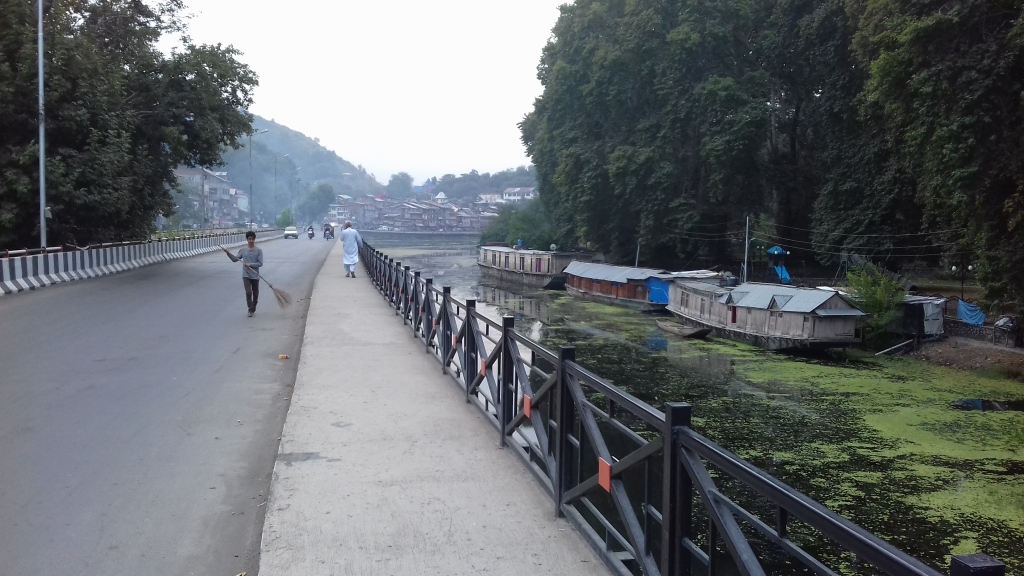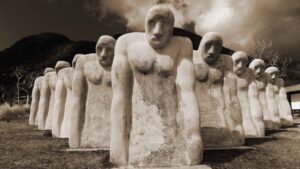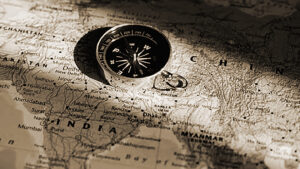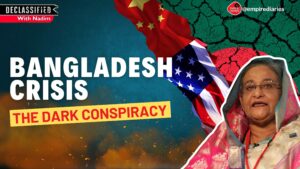This is the third part of an EmpireDiaries.com special series on the Kashmir valley on the occasion of the first anniversary of the scrapping of Article 370 in August 2019. You can read the first, second , fourth and fifth parts here.
 Ratna
Ratna
Srinagar: After stepping out of the Sheikh ul-Alam International Airport in Srinagar, I looked around for a taxi, but there were none in sight. I approached the prepaid taxi booth and got hold of a cabbie. Upon hearing that we were visitors looking for a hotel, he refused a ride saying it will be “too risky” for us.
After looking around for a taxi, I finally managed to coax a guy into agreeing to drive us to the Boulevard Road neighbourhood where some hotels are located.
The taxi driver Hilal hails from a village in Kashmir’s Budgam district. He had been confined to Srinagar ever since the night of August 4, 2019, a day before the scrapping of the Kashmir valley’s semi-autonomous status.
On the drive from the airport to the destination, Srinagar gave me the impression of a giant ghost town. The roads were deserted, all the shops were shuttered, there were no locals in sight, just a few stray dogs lazily sitting along the quiet streets, occasionally some cars passed by, troops could be seen standing guard everywhere, and there were endless coils of concertina wire – this was the ‘new Kashmir’.

Was there no human being in the entire city? Has everybody fled paradise? In a few days’ time, it would be a month since the revocation of Article 370. A new history was being scripted after sweeping away another history. By the look of emptiness all around Srinagar, it seemed time had stopped moving. As if the clocks had forgotten to tick away. It was as if one’s mind had stopped thinking and the body had ceased moving.
Srinagar, the historical city, had just stopped breathing. The first close look of what is fondly called paradise seemed like debris piled in no-man’s land.
Covid-19: How Scientists Are Fighting Against ‘Traitors’ Inside Our Bodies
Hilal, our cabbie, kept on warning me during the drive that we needed to be very cautious and should leave the city as soon as possible.
On the way, we were stopped a few times at check posts by security personnel, where I had to explain to them where and why we were headed out.
With the roads absolutely empty, we arrived in the Boulevard Road area. The sullenness of the neighbourhood down the Dal Lake was a shocking sight for its stark lifelessness.

Bright yellow shikaras were lying idle on the quiet waters. During the good old touristy days, shikaras were the lifeline of the place. But that buzz was nowhere to be felt. A certain stillness made the air heavy. I could feel that grim ambience as we went about looking for a hotel in the Dal Gate locality, which lies right along the Dal Lake.
That search went on for one and a half hours. Hotel after hotel, they kept turning us away, their attendants telling us in hush-hush tones that they were closed. I discovered that a couple of hotels overlooking the Dal Lake had been turned into military camps.
I told Hilal, meanwhile, that we would manage to find a hotel and he could go, but he was concerned for us. He insisted he hung around with me till I found a place to check in. He also suggested it would be “safer” for us to put up at a houseboat instead.
But that would have crippled our movements, I thought, so we kept looking for a hotel on the mainland.
Finally, we had a breakthrough. We found a hotel open in a narrow lane on Boulevard Road. I made the most of my persuasive skills and the hotel’s manager Hashim (name changed) decided to give us a room.

But it was a room towards the rear of the hotel – in order to keep our stay as low-key as possible – and he had a long list of precautionary conditions. He told me not to tell anyone out there that his hotel had let out a room to us. Instead, we were supposed to say that we were put up at a friend’s place.
Also, we were told we could venture out for just three hours in the morning and three hours after sundown as a curfew was in place during the rest of the day, round the clock.
Due to restricted food supplies, the hotel said it could offer us only roti and sabzi and nothing else, whatever was available on a given day.
Hashim told me the hotel used to be manned by a staff of 12 during normal times, but 10 of them left for their native places once the lockdown was put in place. The hotel was forced to shutter operations since August 4.
“Who stops you from taking guests?” I asked him.
“A lot of people, especially the unions,” Hashim said, clearly annoyed with the situation. “I could be beaten up and the hotel could be vandalised if they came to know that we were allowing guests.”
Araria Rape Case Shows How Gender-Insensitive India Still Is
Hashim, as I figured over the course of my stay there, is generally amicable and loves to talk with his guests. Lamenting all the turmoil he’s had to go through in Kashmir, he poured his hear out and told me some compelling stories.
“We ordinary Kashmiris are victims of power politics,” the hotel manager rued. “Our life has become hell. We hate politics and politicians, be it any party. No one is bothered about ordinary people.”
The setting around the hotel area was uneasy and disturbing. Further down the narrow lane where the hotel was located, a building had been taken up by the forces to set up a base camp – which was right across our hotel.

Security personnel could be seen patrolling up and down the lane, and they stood guard right in front of the hotel gate 24 by seven. The only sounds I could hear were those of the boots of security personnel and prayer calls from a nearby mosque.
Sometimes, army men could be seen coming over to the hotel’s reception area to use the landline telephone to call their families.
Also Read: Were Hiroshima-Nagasaki Bombings ‘Terrorist Attacks’?
Ironically, the security personnel who were on the ground in the valley to “protect” the land from troublemakers themselves didn’t know why they had suddenly been ordered to be deployed to Kashmir.
While all of them said they didn’t know they would be posted in Kashmir for a post-abrogation situation, a few of them told me, “Kashmir mey vote hoga, isi liye (We were told we would have to be in Kashmir because there would be elections).”
Hashim was upset with business going bad, saying, “This is the peak season for tourists. We used to let out rooms for Rs 6,000 each during this season.”
“Aren’t you getting bookings from guests now?” I asked.
“Who will come here after taking so much risk?” he lamented. “They won’t be able to visit places. No driver will take them to Pahalgam, Gulmarg and Sonmarg. What is the point of coming here if you can’t roam around freely? I am feeling bad that you people are suffering on your trip.”
Hashim wasn’t exaggerating. I got in touch with the cabbie Hilal, proposing him to take us to a few places outside Srinagar. But he instantly rejected the idea, saying, “You are crazy! It’s very risky for you as well as for us.”
“But why?” I asked.
“We will not be allowed to venture beyond Srinagar in my taxi, security forces will send us back here,” Hilal said. “Anything can happen. If something happens to you, who will take responsibility? Aap log yahaan se jitna jaldi ho sakey nikal jao (Suggest you guys to leave this place as soon as you can).”
“But they are saying everything is normal,” I argued.
“You roam around and see what’s normal and what’s not,” he pointed out.
I couldn’t agree more.
Since landing in Srinagar, I never felt that anything was “normal”. Ordinary Kashmiris were caught in the crossfire between security personnel, militants, stone pelters, local unions and the local government.
Throughout my week-long stay in Srinagar during those tense times, I found nothing that I could call “normalcy”.
“Due to fear, business has disappeared. It’s that time of the year now when we could have earned some money to last the coming winter. But that scope to earn has now been destroyed,” said Hashim.
The average Kashmiri’s mind is perpetually gutted with fear and despair. They really don’t know when and if normalcy will return to paradise. The nights are only getting longer. And they don’t know how much more despair awaits them.
(To be continued)









Spot on report
Nothing can be more true?